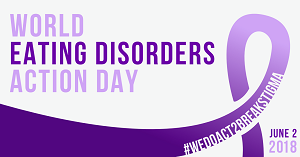Listening to the many voices of experience and digging deep within holds key to reducing stigma
Listening to the many voices of experience and digging deep within holds key to reducing stigma

By Andrea LaMarre
There is still significant stigma around eating disorders; they are framed as disorders of the young, white, vain, rich, and thin. But you have heard about that stereotype before. We repeat it time and again, and yet… very little is changing. We cry from the rooftops: “eating disorders can happen to anyone!” But, we are met with tenacious representations of eating disorders as being a privileged diagnosis. Surely by now we might have made some headway in smashing stigma. Unfortunately, despite the labour of countless activists, researchers, and treatment professionals over the years, we still face an environment in which: a) Only some people are “read” as “legitimately” suffering from eating disorders; and, b) Those who are recognized are assumed to be untrustworthy, vain, and often, beyond hope. These falsehoods persist in the face of our valiant cries and rallying calls, and the stigma is literally killing people.
In my opinion, until we start truly listening to and uplifting the voices of those who have experienced eating disorders, we will not break down this stereotypical representation. To do this is a multi-layered process, however, and it involves a fundamental shift in the way that eating disorders are prevented, researched, and treated. When we restrict research studies to only those who have received diagnoses, we capture only those whose disorders were understood as legitimate by doctors, whose training in eating disorders is extremely limited (to less than 3 hours throughout their education, in many cases). When we respond to “non-compliance” to treatment with removing all support, we lose the trust and the buy-in from those for whom treatment-as-normally-delivered doesn’t fit: people who live far from treatment centres, those who are unable to afford to take time off work and life to attend treatment, those who cannot afford to incorporate meal-plan prescribed variety into their diets, those for whom current treatment modalities are culturally inappropriate. When we try to prevent eating disorders and “obesity” (a body size, not a disorder) at the same time, we send extremely mixed messages about how we are supposed to live in our bodies. When we continue to try the same strategies, year after year, despite knowing that they do not work for all people, we are allowing stereotypes and stigmas to persist.
Breaking down stigma is a systemic task, but it starts from within. It starts by thinking deeply about the reactions we each have when we see differently sized bodies. It starts by recognizing the way societal prejudices and assumptions and messages seep in to our own frames of thinking. When we can acknowledge that we all carry biases, we can start to challenge them. When we are open—truly open—to hearing stories that do not fit with our pre-imagined narratives of what eating disorders and recovery look like, we can start to move, ever-so-slowly, to a place of more openness and support.
About Andrea
Andrea LaMarre is a PhD candidate in the Department of Family Relations and Applied Nutrition at the University of Guelph. Her research focuses on eating disorder recovery from the perspective of people in recovery from eating disorders. Andrea is involved in the eating disorder awareness community as co-chair of the Academy for Eating Disorders (AED) Recovery Special Interest Group and a member of the AED advocacy and communications committee, a member of the Eating Disorders Association of Canada, as a volunteer for the National Initiative for Eating Disorders, and chair of the Association for Size Diversity and Health’s social media committee.
 Take part in World Eating Disorders Action Day
Take part in World Eating Disorders Action Day
World Eating Disorders Action Day on June 2, 2018 is a grassroots movement designed for and by people affected by an eating disorder, their families, and the medical and health professionals who support them. Uniting activists across the globe, the aim is to expand global awareness of eating disorders as genetically linked, treatable illnesses that can affect anyone. The Third Annual #WorldEatingDisordersDay will take place on June 2, 2018 with a focus on breaking stigma about Eating Disorders. #WeDoAct2BreakStigma.
Join the virtual campaign on social media and host a local event to share information and advocate for policy change to ensure access to evidence based treatment for all affected.





